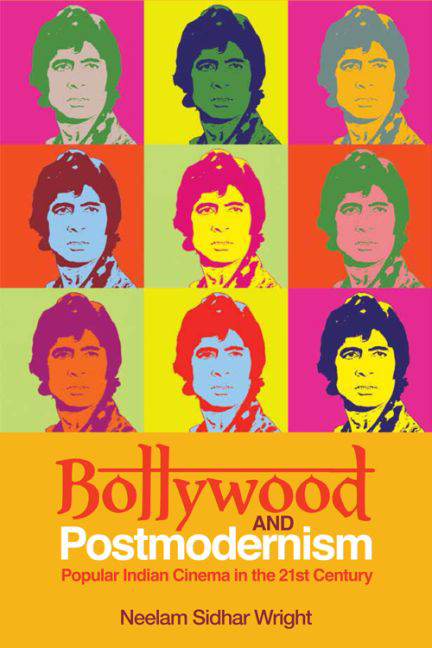Book contents
- Frontmatter
- Contents
- Acknowledgements
- List of Figures
- List of Abbreviations of Film Titles
- 1 Introduction: The Bollywood Eclipse
- 2 Anti-Bollywood: Traditional Modes of Studying Indian Cinema
- 3 Pedagogic Practices and Newer Approaches to Contemporary Bollywood Cinema
- 4 Postmodernism and India
- 5 Postmodern Bollywood
- 6 Indian Cinema: A History of Repetition
- 7 Contemporary Bollywood Remakes
- 8 Conclusion: A Bollywood Renaissance?
- Bibliography
- List of Additional Reading
- Appendix: Popular Indian Film Remakes
- Filmography
- Index
5 - Postmodern Bollywood
Published online by Cambridge University Press: 12 September 2017
- Frontmatter
- Contents
- Acknowledgements
- List of Figures
- List of Abbreviations of Film Titles
- 1 Introduction: The Bollywood Eclipse
- 2 Anti-Bollywood: Traditional Modes of Studying Indian Cinema
- 3 Pedagogic Practices and Newer Approaches to Contemporary Bollywood Cinema
- 4 Postmodernism and India
- 5 Postmodern Bollywood
- 6 Indian Cinema: A History of Repetition
- 7 Contemporary Bollywood Remakes
- 8 Conclusion: A Bollywood Renaissance?
- Bibliography
- List of Additional Reading
- Appendix: Popular Indian Film Remakes
- Filmography
- Index
Summary
POSTMODERNISM AND FILM THEORY
In the following case studies, I observe a variety of postmodern strate-gies and conventions operating within contemporary Bollywood cinema. Throughout the remainder of this book, I draw from a selection of seminal postmodern works, including Jean Baudrillard's (1983) formulation of postmodern hyperrealism (the extinction of actual reality and its substitution by the endless saturation of ‘simulated’ images) and Fredric Jameson's scrutiny of postmodern art as nostalgic, depthless, soulless pastiche, leading to the annihilation of temporality in which past and history collapse into the present. Jean François Lyotard's celebration of the sublime, the presentation of the unpresentable in postmodern art, and the destruction of grand monolithic narratives, will also be drawn upon. Furthermore, in relation to the issue of historical temporality, I have also been informed by Hayden White's (1978, 1996) enlightening work on the blurring of the boundaries of historical truth as fact and as fictional narrative.
My work also draws influences from theorists who have attempted to develop these ideas specifically in relation to the medium of cinema. This primarily includes Scott Lash's (1988) expansion of Baudrillard's concept of the simulacrum through observation of its prioritisation of the figural over discourse and consequent subordination of meaning and signification, specifically with respect to Hollywood's spectacle-based cinema, and Linda Hutcheon's (1988, 1989) retorts against Jameson's ideas of postmodern depthlessness and a-historicism in nostalgia films, arguing instead for a politics of representation and a reworking of the past in postmodern cinema.
In addition to Hutcheon, there are several other scholars who have tried to salvage meaning and value in the cinematic postmodern text. Catherine Constable's (2005) account of postmodernism and film has explored how its inherent intertextuality and visual stylisation can enrich characterisation and assist narrative comprehension. Her brief analysis of Face/O™ also argues for how character interiority can also be achieved through postmodern techniques. Peter and Will Brooker's reader Postmodern After-Images also disputes the blankness and nihilism of postmodern films, this time drawing attention to the deconstructive effects of intertextual devices which challenge distinctions between true original and false copy (Brooker and Brooker, 1997a: 94).
- Type
- Chapter
- Information
- Bollywood and PostmodernismPopular Indian Cinema in the 21st Century, pp. 79 - 127Publisher: Edinburgh University PressPrint publication year: 2015



